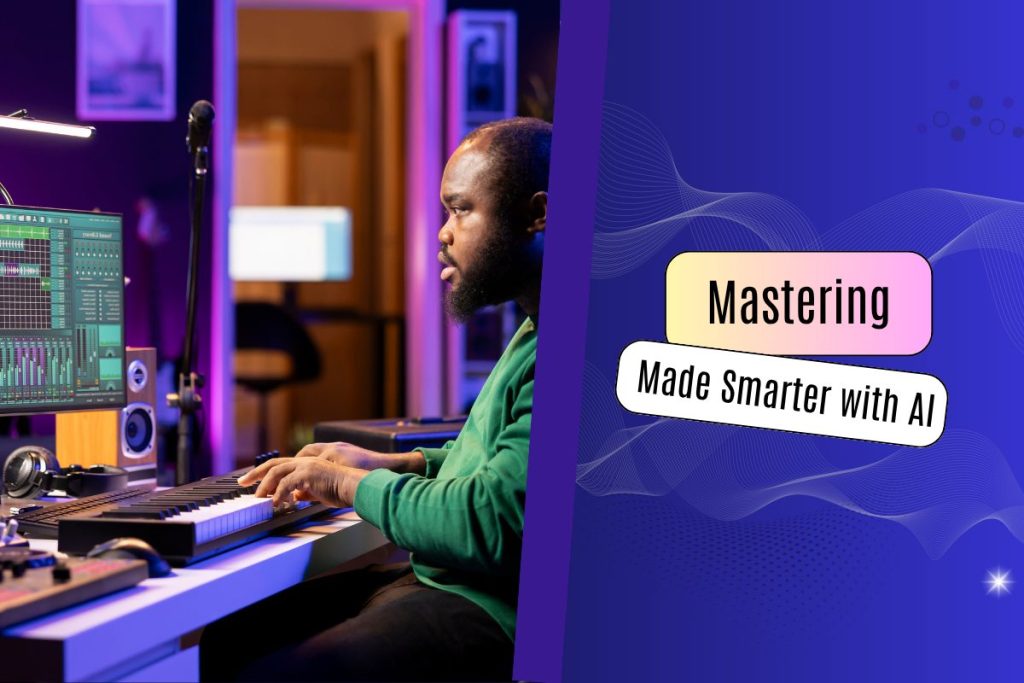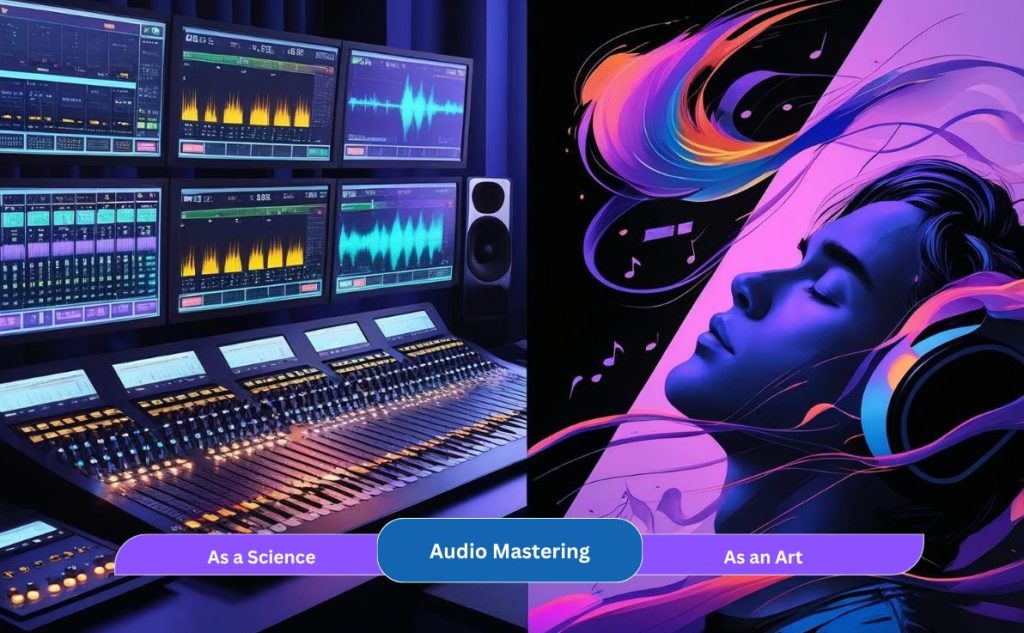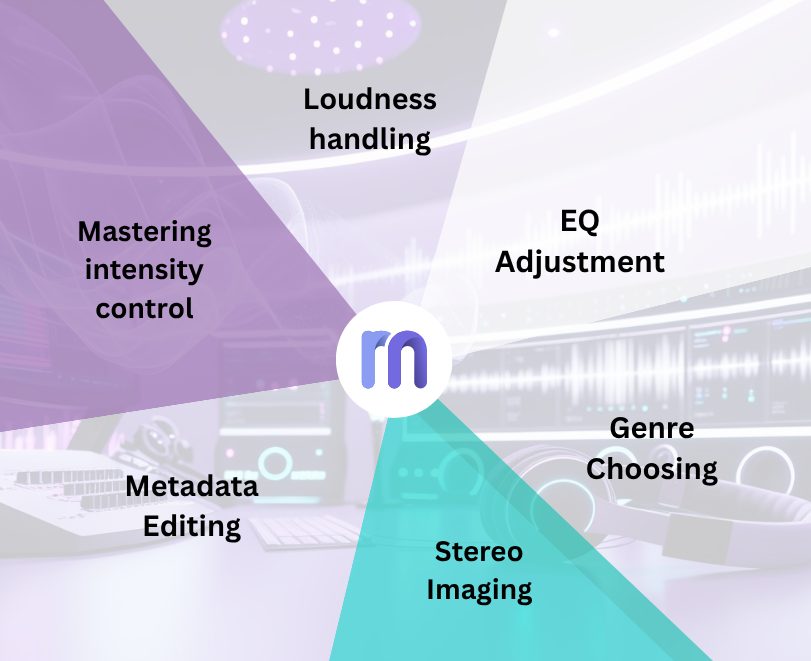Remember when mastering music was only for those who could afford pricey studios? Well, that’s no longer the case. AI-based mastering has transformed the process, making it faster, more affordable, and easier than ever. It’s not just a fancy term; it’s a game-changer for music producers who want pro-level sound without spending a fortune. But can AI really match a human engineer? Does it bring the same creativity, or is it just another automated shortcut?
In this blog, we’ll explore how AI mastering is changing music production. We’ll cover its benefits, challenges, and future possibilities—helping you decide if it’s the right tool for your tracks.
Let’s dive in!

Table of Contents
- AI Mastering: What & How?
- ProbProblems in Traditional Audio Mastering
- Benefits of Using AI Mastering for Your Music
- Challenges and Limitations of AI-based Mastering
- How to Get Better Results with AI Mastering
- What’s the Future of AI in Music Production?
- Try AI Mastering Yourself with Remasterify
- Frequently Asked Questions
AI Mastering: What & How?
If you’ve ever struggled to make your track sound clear, loud, and balanced, you’re not alone. Mastering is the final step that turns a rough mix into a professional, ready-to-release song. But in the past, it needed a skilled engineer, expensive gear, and hours of work.
Now, AI mastering is changing that. Instead of relying only on human ears, smart technology listens to your track, compares it to top-quality songs, and adjusts EQ, compression, stereo width, and loudness, all in just minutes.
So, how does it work?

- Machine Learning & Audio Analysis: AI scans your tracks, identifying weak spots in dynamics, frequency balance, and overall clarity.
- Automated Mastering Adjustments: Based on the analysis, AI fine-tunes elements like bass depth, midrange warmth, and treble sharpness to optimize sound quality.
- Genre-Specific optimization: Many online software tools allow you to select genre-based presets, ensuring that a hip-hop track doesn’t get mastered like a classical symphony.
- Instant Preview & Customization: AI mastering platforms often let you compare different mastering styles in real time, giving you control over the final sound.
This isn’t just automation, it’s a music production innovation that makes sound quality enhancement accessible to everyone. Whether you’re a beginner or a pro, AI Mastering simplifies the process, letting you focus on what truly matters.
Problems in Traditional Audio Mastering

Mastering has always been that final, crucial step between a good track and a streaming-ready, professional-sounding song. But let’s be real; traditional Mastering comes with some serious roadblocks, especially for independent producers, beginners, and budget-conscious musicians.
1. High Costs That Break the Bank
Professional mastering engineers charge a lot of money. For independent artists and small-budget producers, that’s a huge dent in the wallet, especially when working on full albums or frequent releases. If you’re just starting out, hiring an engineer for every track isn’t always realistic.
2. Time-Consuming & Slows Down Releases
The traditional mastering process isn’t instant. You submit your mix, wait for revisions, go back and forth with the engineer, and sometimes, it takes days or even weeks to get the final master. In the fast-paced digital music scene, this delay can kill momentum, especially if you need a quick turnaround for a release or social media drop.
3. Technical Barriers for New Artists

Mastering is art and science. one that takes years to master (no pun intended!). If you’re a DIY musician trying to learn the ropes, you’re dealing with complex plugins, complicated EQ curves, multi-band compression, and loudness standards. It’s overwhelming, and without proper training, you risk over-processing or ruining your mix.
Traditional mastering is expensive, time-consuming, and technically demanding, which is exactly why many producers are looking for cost-effective mastering solutions like AI mastering. But does AI actually solve these issues? Let’s break it down next.
Benefits of Using AI Mastering for Your Music
If traditional Mastering feels too expensive, slow, and complicated, then AI-based Mastering is like a breath of fresh air. It’s designed to remove barriers, making high-quality Mastering accessible to everyone—whether you’re an independent artist, a budget-conscious producer, or just starting out. Let’s break down exactly how it solves the problems that come with traditional Mastering.
1. Cost-Effective Mastering Solutions
Traditional Mastering can drain your budget, but Automated Audio Processing software deliver studio-quality results at a fraction of the price. Many platforms offer:
- Pay-per-track options for a few dollars.
- Subscription-based plans that allow unlimited Mastering.
For independent musicians who need frequent releases, this is a game-changer—you can get professional sound without worrying about breaking the bank.
2. Instant Mastering – No More Waiting
One of the biggest frustrations with traditional Mastering? The long wait times. AI-powered tools eliminate that by delivering instant results.
- Upload your track, select preferences, and get a mastered version in minutes.
- Need changes? Just tweak and reprocess instantly.
For artists who want fast turnarounds, this means you can release music quicker and keep up with the fast-moving industry.
3. Beginner-Friendly – No Technical Skills Required
If you’re not an expert in EQ balancing, compression, or stereo imaging, don’t worry—AI-based Mastering does the technical work for you.
- No need to study complex mastering techniques—just focus on making music.
- Many online platforms offer genre-specific presets, so you don’t have to guess what settings work best.
This enables sound quality enhancement to be accessible to everyone, even those with zero experience in sound engineering.
Challenges and Limitations of AI-based Mastering
AI-based Mastering has undoubtedly changed the game, making professional-quality sound more accessible and affordable. But let’s be honest—it’s not perfect. While AI excels in automated Mastering and efficiency, it does come with certain limitations that can affect creativity, flexibility, and overall sound quality.
1. Lack of Human Intuition and Artistic Judgment
A professional mastering engineer listens to a track in context, making adjustments based on emotion, genre nuances, and the artist’s vision. On the other hand, AI relies on predefined algorithms and data-driven analysis.
- Lacks Human Warmth and Creativity – While AI-based Mastering can deliver balanced and polished audio, it may not help you capture the unique warmth and creative subtlety that a human touch provides.
- Unwanted Fixes – If your track has intentional imperfections, a raw edge, or a unique sound, AI might “fix” things that weren’t broken in the first place.
Automated Audio Mastering Tools are great for standardizing sound, but they lack the emotional depth and creative instincts of a human engineer.
2. Genre-Specific Limitations
AI is trained on thousands of tracks, but it doesn’t always get every genre right—especially for music styles with complex dynamics, unconventional mixing, or live recordings.
- Works Best for Certain Genres – AI mostly excels in electronic, hip-hop, and pop.
- Struggles with Complex Music – However, jazz, classical, and experimental music often require delicate and highly customized Mastering, which AI might not handle well.
AI-based Mastering works best for mainstream genres but may struggle with more intricate or organic soundscapes. While some online tools allows you to select genre-based mastering styles, it still operates within a fixed framework.
3. Dependence on Pre-Set Algorithms
AI mastering follows a pre-set algorithm, meaning it applies standard industry techniques without considering the unique personality of your track. While this works well for general improvements, it may fall short in situations where:
- Sound Generic – Generic-sounding masters that lack uniqueness.
- Limited Creative Flexibility – Limited ability to break the “rules” when creative distortion, dynamic range manipulation, or custom EQ sculpting is needed for your track.
While AI-based Mastering is powerful, it’s still a one-size-fits-most solution—it may not fully align with your creative vision.
So, Is AI-based Mastering a Flawless Solution?
Not quite. While it’s a game-changer in terms of affordability, speed, and accessibility, it still has limitations in creativity, genre adaptability, and customization.
But don’t worry—there are ways to work around these challenges to get the best of both worlds.
How to Get Better Results with AI Mastering

So, online tools aren’t perfect, but that doesn’t mean you can’t get the best out of them. Just like any tool, how you use it makes all the difference. The key is understanding its limitations and working around them to make sure your tracks sound the way you want them to.
1. Use a Hybrid Approach: AI + Human Touch
AI-based Mastering is great for quick, consistent results, but that doesn’t mean you should rely on it 100%. Many professional producers use a hybrid approach—letting AI handle the technical side first and then manually tweaking the results for a more customized sound.
- Use AI to get a clean, balanced master quickly.
- Then, fine-tune it for more character and depth.
Think of AI as your assistant, not your replacement—it gets you 80% there, and you handle the final touch.
2. Choose Best Customizable AI Mastering Tools

Not all online AI mastering software is the same. Some platforms lock you into a one-size-fits-all sound, but others give you more control over the final result. Look for AI mastering services that offer:
- Genre-specific mastering styles (hip-hop, rock, pop, etc.).
- Loudness and EQ adjustments so you can tweak your sound.
- A/B comparison tools to preview different mastering options.
The more control you have, the more AI mastering feels like a tool rather than a limitation.
3. Use AI Mastering Strategically for Different Genres
AI is great for electronic, hip-hop, and pop, but what about other genres? If you’re working with a genre that requires delicate Mastering, you can:
- Use AI for an initial balance and then refine it manually according to your needs.
- Test different AI settings to see which one best suit your soundtrack.
- Consider hybrid mastering services that combine AI processing with real human engineers.
AI is powerful, but knowing when to step in and adjust settings is key to getting the best results.
What’s the Future of AI in Music Production?
AI isn’t just a passing trend in music production; it’s shaping the future of mastering in ways we couldn’t have imagined a decade ago. With rapid advancements in machine learning and intelligent automation, AI Mastering is evolving beyond just an instant fix; it’s becoming a powerful creative tool that fits right into the future of Mastering.
1. AI will keep Getting Smarter and More Adaptive
Right now, AI Mastering relies on pre-trained algorithms to analyze and enhance tracks. But the future? It’s all about adaptive AI models that learn from your preferences and adjust their mastering style accordingly.
- AI will become more responsive to your creative choices, enabling you to train it based on their specific sound preferences.
- Future automated mastering systems may include real-time feedback, giving artists suggestions on mix adjustments before even hitting “master.”
This means AI won’t just “guess” how you want your track to sound—it will actually “learn” your style over time.
2. AI will Enhance Collaboration with Audio Engineers
AI is fast and efficient, but can it truly replace human artistic judgment? Not quite. Instead of seeing AI as a replacement for mastering engineers, think of it as a collaborative tool that makes the process easier and more efficient.
- AI can speed up repetitive mastering tasks, allowing engineers to focus on the creative side of the process.
- More studios are already integrating hybrid AI-human mastering workflows, where AI pre-master tracks and engineers refine them further.
The future of Mastering isn’t a battle between AI and humans, it’s about how the two can work together to make music sound better than ever.
3. AI will Standardize High-Quality Mastering for Everyone
One of the biggest impacts of music production innovation is how AI makes mastering affordable and accessible. In the future:
- No expensive studio? No problem. AI mastering platforms offer cost-effective mastering solutions that you can afford.
- No technical expertise? AI takes care of sound quality enhancement and mastering workflow optimization, so you don’t have to stress about compressors and limiters.
- You’ll be able to master your track in real time—without even leaving your Digital Audio Workstation (DAW).
No more gatekeeping; AI Mastering is paving the way for anyone to achieve pro-level sound, regardless of budget or experience. And now, with AI-powered mastering available on mobile, you can get studio-quality tracks in minutes. Learn how to master your music on the go.
Try AI Mastering Yourself with Remasterify

Mastering can be intimidating, especially if you’re not an audio engineer. That’s where Remasterify comes in. This is one of the best audio mastering services designed to make studio-quality mastering effortless and accessible for all musicians.
- No Tech Hassles – Upload your track, select your preferences, and let AI handle the mastering in minutes.
- Custom Sound Control – Adjust mastering intensity for a subtle enhancement or a bold, punchy sound.
- Stereo Imaging & LUFS Control – Widen your mix and ensure streaming-ready loudness for consistency across platforms.
- Fast & High-Quality Processing – Get instant, pro-level results without a long wait.
If you’re ready to experience hassle-free AI mastering, give Remasterify a try today!
Final Thoughts
AI Mastering is changing the game for music producers, making mastering faster, more affordable, and accessible to everyone. No more draining your budget on expensive engineers or waiting weeks for a final master, AI lets you get studio-quality sound in minutes, keeping your creative flow uninterrupted.
But let’s be real, AI isn’t perfect. It’s great for efficiency, but it doesn’t have the human touch, intuition, or artistic feel that some tracks need. If your music relies on unique textures, warmth, or unconventional dynamics, AI might not fully capture your vision. That’s where a little manual tweaking can make all the difference.
The future of Mastering isn’t AI vs. Humans; it’s AI and humans working together. The best producers will know when to trust AI for speed and when to step in for creativity, and that’s how you’ll truly master the future of music production.
Frequently Asked Questions
AI mastering can deliver near-professional sound quality for many use cases. It offers better results for genres like hip-hop, pop, EDM, and lo-fi. While the human touch in terms of emotional depth is still required, AI mastering will give you consistent, polished results that are more than good enough for streaming platforms, demos, and content releases. The tools like Remasterify analyze your track, apply EQ, compression, and loudness adjustments based on data from thousands of professionally mastered songs.
AI mastering works best for well-mixed digital genres like EDM, trap, pop, and rap. These genres follow consistent loudness and tonal balance standards, that makes them easier for AI algorithms to handle. However, for genres like jazz, classical, acoustic, or ambient music that require delicate dynamic range or warmth, AI might fall short. The solution is adapting hybrid workflows: where you use AI to get a base master, then manually refine it for emotional nuance.
For beginners, the best AI mastering tool is one that’s easy to use, gives real-time results, and doesn’t require technical audio knowledge, also costs you minimal. Remasterify is a top choice for new producers; it allows you to upload your song, tweak loudness or stereo width, and get a polished master within minutes. It also offers automatic EQ and LUFS normalization, making your tracks ready for Spotify or YouTube without confusing settings.
Yes, AI mastering can be used for commercial music releases, especially for singles, EPs, and social media-ready tracks. AI mastering tools apply standard audio enhancements like EQ balance, compression, and loudness control. That ensures your track meets the streaming platform requirements (like -14 LUFS for Spotify). If your song is well-mixed, AI mastering can give it a clean, professional finish, no doubt. Many artists now release AI-mastered tracks on platforms like Apple Music, YouTube, and SoundCloud. Remasterify, for example, includes LUFS-level controls and metadata editing, so your masters are fully ready for commercial distribution.
AI mastering is often better than basic online plugins or DAW presets. The AI is already fed with adequate data required. Then it listens to your audio and makes decisions based on intelligent analysis, not static settings. Plugins in your DAW might apply general compression or EQ, but they don’t adapt to each song’s unique structure or genre. AI mastering tools, like Remasterify, use machine learning to compare your track against thousands of mastered references and apply precise adjustments in real-time. It’s faster, more adaptive, and doesn’t require you to know mastering techniques. For creators who want speed and quality without complexity, AI is the smarter choice.
